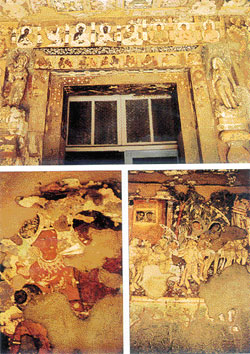Walking with the Buddha
by Ravi Teja Sharma, Business Standard, June 1, 2006
The long-neglected Buddhist circuit is finally set for a makeover, with a little help from friends.
New Delhi, India -- Buddhism was born in India and many of the most revered Buddhist pilgrimage sites are in India but, ironically, the Buddhist circuit has been badly neglected by the tourism authorities.

Ask any tour operator and he will tell you how harrowing a road trip on the Buddhist circuit in the north is. Bad roads coupled with lack of amenities add to the woes.
Contrast this with the fact that we are sitting on a goldmine of culture (read the Buddhist circuit) and one that is sought after by many of our close neighbours in South Asia and the Far East (all short-haul, mind it).
“About 90-93 per cent people practicing Buddhism stay in the ASEAN region, Far East and Japan, which can easily be tapped by India,” says Lajpat Rai, managing director of Lotus Trans Travels. What India has tapped so far is “just the tip of the iceberg”.
The government is finally trying to remedy this situation. The tourism ministry has already spent almost Rs 95 crore for development of infrastructure at Buddhist sites across the country.
To enhance the tourism facilities in the Buddhist circuit of Bihar, the ministry has committed Rs 50 crore in 2006-07.
The Japan Bank for International Cooperation (JBIC) is also pitching in with a Rs 395 crore loan, to be disbursed over seven years, for developing infrastructure in important Buddhist sites in Uttar Pradesh — Sarnath, Kushinagar, Kapilvastu, Sravasti and Sankisa — an exercise which is estimated to cost a total of Rs 680 crore.
The work includes strengthening and widening of national and state highways, roadside plantations, conservation of monuments, landscaping, development of tourist villages and wayside amenities.
In April, the minister for tourism and culture, Ambika Soni visited the Buddhist sites of Bodhgaya, Rajgir and Nalanda to review the situation and develop a master plan for the integrated development of Bodhgaya. Allowing vehicles beyond a point (like in Agra) and using green buses to ferry visitors to the temple was one of the proposals mooted.
It was also decided to improve the surroundings by creating a 7-acre meditation and spiritual park (plan to be prepared by Housing and Urban Development Corporation or HUDCO) around the Mahabodhi temple in Bodhgaya.
These steps may encourage some travel but tour operators handling Buddhist tours feel that the priority for the government should be to provide air connectivity between the various Buddhist sites in the north to attract larger number of international tourists. That is being done, and to begin with, the airports in these cities are being spruced up.
“The ministry of tourism has now decided to pursue action for upgradation of Bodhgaya airport to international standards as well as ensuring domestic flights to the city. We want to create a unique holistic experience for tourists,” says Amitabh Kant, joint secretary, ministry of tourism.
The ministry has been serious about promoting the Buddhist circuit in the South East Asian market for which it launched the “Come to India - Walk with the Buddha” campaign last year.
This year’s highlight is the year-long celebrations of the 2,550 years of Buddha’s Parinirvana (giving up of the body), which were kicked off last month.

 Ask any tour operator and he will tell you how harrowing a road trip on the Buddhist circuit in the north is. Bad roads coupled with lack of amenities add to the woes.
Ask any tour operator and he will tell you how harrowing a road trip on the Buddhist circuit in the north is. Bad roads coupled with lack of amenities add to the woes.